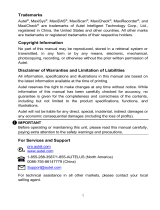viii
12.2.1 Inspect the Battery .................................................................................... 107
12.2.2 Connect the Battery Tester ....................................................................... 108
12.3 IN-VEHICLE TEST .............................................................................................. 109
12.3.1 Battery Test .............................................................................................. 110
12.3.2 Starter Test ............................................................................................... 112
12.3.3 Generator Test ......................................................................................... 112
12.4 OUT-OF-VEHICLE TEST ..................................................................................... 114
12.4.1 Test Procedure ......................................................................................... 114
12.4.2 Test Results .............................................................................................. 115
13 DATA MANAGER ....................................................................................................... 116
13.1 VEHICLE HISTORY ............................................................................................ 117
13.1.1 Historical Test Record .............................................................................. 118
13.2 WORKSHOP INFORMATION................................................................................. 119
13.3 CUSTOMER ...................................................................................................... 120
13.4 IMAGE ............................................................................................................. 121
13.5 CLOUD REPORT ............................................................................................... 123
13.6 PDF FILES ...................................................................................................... 123
13.7 REVIEW DATA .................................................................................................. 123
13.8 DATA LOGGING ................................................................................................ 124
13.9 UNINSTALL APPS .............................................................................................. 124
14 REMOTE DESKTOP ................................................................................................... 125
15 OEM AUTHORIZATION .............................................................................................. 127
16 SUPPORT ................................................................................................................... 128
16.1 PRODUCT REGISTRATION .................................................................................. 128
16.2 SUPPORT SCREEN LAYOUT ............................................................................... 128
16.3 MY ACCOUNT .................................................................................................. 129
16.4 DATA LOGGING ................................................................................................ 129
16.5 TRAINING ........................................................................................................ 130
16.6 FAQ ............................................................................................................... 130
17 MAXIVIEWER ............................................................................................................. 131
18 MAXIVIDEO ................................................................................................................ 132
19 QUICK LINK ............................................................................................................... 133
20 AUTEL USER CENTER .............................................................................................. 134


























